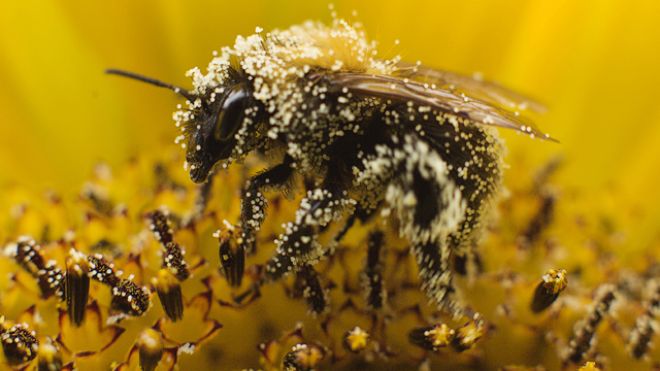Bee Pollen
Bee pollen has long been recognized for its many health benefits. In particular, it is known for its ability to improve skin health and to rejuvenate the skin.

What is Bee Pollen?
"Bee pollen" is the substance that is created when bees mix together: (1) nectar or honey; (2) bee saliva; and (3) the plant pollen that the bees collect from flowers. Bee pollen is a large part of the bee's diet. Young bees in particular eat a lot of the protein-rich bee pollen. The plant pollen that bees collect from flowers is the male seed of the flower. It is a powdery substance found in the stamen, the male reproductive part of the flower.
On their foraging trips bees pack the pollen it into the "pollen baskets" on the outside of their rear legs. Bees must visit between 50 and 100 flowers to fill their pollen baskets. When the baskets are full the bees return to the hive and transfer the pollen to the younger bees who store it for food. At least 50 foraging trips are needed to bring 1 gram of pollen back to the hive. The full colony of bees is capable of carrying as many as 20,000 - 50,000 loads of pollen each day. As part of the pollen foraging process bees get the powdery substance caught on the hairs that cover their bodies. As they travel between flowers they incidentally pollinate the next flowers they visit. In this way the bees help reproduce the plant species. As recently explained in the new documentary film Queen of the Sun, What Are the Bees Telling Us: "Bees are the legs of plants."

Why is Bee Pollen so Nutritious?
Bee pollen is widely regarded as the most nutritious substance known to science. Why is this true? Because plants need bees. In order to reproduce, plants must compete for the attention of bees. To succeed in this competition, plants must offer bees the most nutritious substance possible. Over tens of millions of years, successful plants have done just that, creating a highly complex and dense substance that is astoundingly nutritious.
Numerous scientists have concluded that bee pollen is a complete source of nutrition, containing all the enzymes, vitamins, amino acids, hormones, and trace elements needed by the body for cell growth. No one food contains all of these nutritional components - except bee pollen. Noted nutritionist Dr. Betty Lee Morales explained, "Bee pollen is the only food which contains every essential nutrient needed by mankind for perfect health."

How People Use Pollen
People have been using bee pollen for medicinal purposes for thousands of years. The benefits of pollen have been discussed in the Bible, the Talmud, the Torah, the Koran and other religious texts. Pollen was written about by the ancient Chinese and Egyptians. It has long been prescribed for its healing properties by the ancient traditional health practitioners - including Hippocrates, the "Father of modern medicine," Pliny the Elder, and Pythagoras.
In modern medical texts and studies bee pollen has been recognized as beneficial in treating a wide variety of ailments. Dr. Carlson Wade, in his book About Pollen states, "The healing, rejuvenating and disease-fighting effects of this total nutrient are hard to believe, yet are fully documented. Aging, digestive upsets, prostate disease, sore throats, acne, fatigue, sexual problems, allergies, and a host of other problems, have been successfully treated by the use of pollen."
In addition to these internal health benefits, bee pollen has also been shown to be a potent treatment for skin health. The following are just a few examples of such scientific findings:
- Dr. M. Esperrois, of the French Institute of Chemistry, concluded from his experiments that bee pollen contains potent antibiotics and also reverses the aging of the skin, correcting darkening, wrinkles, and blemishes.
- Dr. Henri Luzuy, in his work "Pollen - The Biological Principle in Cosmetology" says, "Pollen extracts can be considered as factors of particular importance in the regeneration and rejuvenation of the skin. The first visible effect of the cosmetic preparations with a pollen extract base is the clearing of the complexion."
- Dr. Lars-Erik Essen says, "Through [nutrition administered through the skin], bee pollen exerts a profound biological effect. It seems to prevent premature aging of the cells and stimulates growth of new skin tissue. It offers effective protection against dehydration and injects new life into dry cells. It smoothes away wrinkles and stimulates a life-giving blood supply to all skin cells. The skin becomes younger looking, less vulnerable to wrinkles, smoother, and healthier with the use of honeybee pollen."
- Professors N. Mankovsky and D. G. Chebotarev, found that bee pollen renews skin cells. They explain: "The rejuvenation of skin and body cells can be encouraged by the administration of the poly-vitamins, microelements, enzymes, hormones, and amino acids present in bee pollen."
At Honey Girl Organics, we use bee pollen in most of our products for the benefits it brings to skin health. The antioxidants in bee pollen fight skin damage caused by free radicals. The many nutrients nourish and rejuvenate the skin.
Simply stated, bee pollen is yet another amazing gift from the most generous, valuable, and extraordinary insect on earth.


